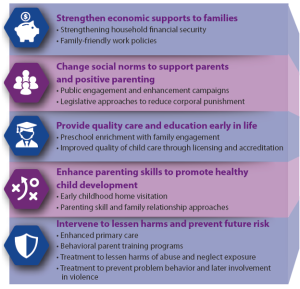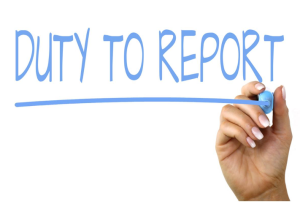Module 8.2 Preventing Child Maltreatment
Learning Objectives
By the end of this module, you should be able to:
- Discuss protective factors and prevention strategies
- Explain what mandated reporting is and who it applies to
Protective Factors
Protective factors may lessen the likelihood of children being abused or neglected. Protective factors have not been studied as extensively or rigorously as risk factors. Identifying and understanding protective factors are equally as important as researching risk factors.
Family Protective Factors
- Supportive family environment and social networks
- Concrete support for basic needs
- Nurturing parenting skills
- Stable family relationships
- Household rules and child monitoring
- Parental employment
- Parental education
- Adequate housing
- Access to health care and social services
- Caring adults outside the family who can serve as role models or mentors
Community Protective Factors
- Communities that support families and take responsibility for preventing abuse
Preventative Strategies
Child abuse and neglect are serious problems that can have lasting harmful effects on its victims. The goal in preventing child abuse and neglect is to stop this violence from happening in the first place.
Child abuse and neglect are complex problems rooted in unhealthy relationships and environments. Preventing child abuse and neglect requires addressing factors at all levels of the social ecology–the individual, relational, community, and societal levels. Families who have access to quality childcare, which increases the likelihood that children will experience safe, stable, nurturing relationships and environments. Access to affordable childcare also reduces parental stress and maternal depression, which are risk factors for child abuse and neglect.

What Early Learning and Childcare Programs Should Do to Help
It is critical that educators be prepared to work with and guide these children and families to needed services. Educators and administrators can support the child and family during times of stress by making hotline and other domestic violence information available to families.
The early learning and childcare workforce consists largely of women, and women are disproportionately affected by domestic violence. Therefore, information about appropriate services and programs should be made available for both staff and families.
Duty to Report
In Ontario, requirements to report child abuse, suspicions of harm or the risk of harm to children are set out in the Child, Youth and Family Services Act 2017 (CYFSA). Failure to report by a Registered Early Childhood Educator (RECE) may also constitute professional misconduct under the College of Early Childhood Educators Code of Ethics and Standards of Practice, Standard VI: Confidentiality, Release of Information and Duty to Report.
It is important to note that RECEs are not required to be certain that a child is in need of protection before reporting. Anyone who has reasonable grounds to suspect risk or harm has a duty to report. “Reasonable grounds refers to the information that an average person, using normal and honest judgement, would need in order to decide to report.” (College of Early Childhood Educators, 2019, p.3)
The CYFSA also stipulates that an individual who has a duty to report must make that report directly to a Children’s Aid Society; that is, they cannot rely on someone else to report on their behalf.
Section 125 of the CYFSA sets out the reportable harms, risks, and circumstances:
- Physical harm
- Sexual harm
- Emotional harm
- Abandonment
- Acts of a criminal nature
The CYFSA does not specifically reference exposure to family violence as a reportable harm, risk, or circumstance. However, the College of Early Childhood Educators position is that RECEs have a duty to report suspected exposure to family violence to a Children’s Aid Society.
Confidentiality
A RECE may be required to provide confidential information when submitting a report. “Section 125(10) of the CYFSA states that no action shall be instituted against a person who makes a report including confidential information unless the person acts maliciously or without reasonable grounds for the suspicion.” (College of Early Childhood Educators, 2019, p.5)
Consequences of Not Reporting under the Child, Youth and Family Services Act 2017
If a RECE fails to report a reasonable suspicion of abuse, harm, or risk of harm they may be liable to a fine of up to $5,000. An employer may also be held liable and fined if its employees have contravened reporting requirements.
Consequences of Not Reporting under the ECE Act
According to the College Early Childhood Educators Professional Advisory: Duty to Report (2019) “If a complaint is made against a member for failure to report under the CYFSA, or the Registrar believes on reasonable and probable grounds that a member has failed to report as required under the CYFSA, the matter will be investigated and considered by the College’s Complaints Committee. The Complaints Committee may refer the matter to the Discipline Committee for a hearing. A discipline hearing may result in a finding of professional misconduct against a member, in which case the College’s Discipline Committee may make various orders, the most serious of which is an order directing that a member’s Certificate of Registration be revoked.” (College of Early Childhood Educators, 2019, p.6)

The Impact of Childhood Trauma on Well-Being
Child abuse and neglect can have lifelong implications for victims, including on their wellbeing. While the physical wounds may heal, there are many long-term consequences of experiencing the trauma of abuse or neglect. A child or youth’s ability to cope and thrive after trauma is called “resilience.” With help, many of these children can work through and overcome their past experiences.
Children who are maltreated may be at risk of experiencing cognitive delays and emotional difficulties, among other issues, which can affect many aspects of their lives, including their academic outcomes and social skills development (Bick & Nelson, 2016). Experiencing childhood maltreatment also is a risk factor for depression, anxiety, and other psychiatric disorders (Fuller-Thomson, 2016).
Working with Children that Have Been Abused
Children who have experienced abuse or neglect need support from caring adults who understand the impact of trauma and how to help. Educators should consider the following suggestions:
- Help children feel safe. Support them in expressing and managing intense emotions. Help children understand their trauma history and current experiences (for example, by helping them understand that what happened was not their fault or helping them see how their current emotions might be related to past trauma).
- Assess the impact of trauma on the child and address any trauma-related challenges in the child’s behavior, development, and relationships.
- Support and promote safe and stable relationships in the child’s life, including supporting the child’s family and caregivers if appropriate. Often parents and caregivers have also experienced trauma.
- Manage your own stress. Educators who have histories of trauma themselves may be at particular risk of experiencing secondary trauma symptoms.
- Refer the child to trauma-informed services, which may be more effective than generic services that do not address trauma.
Important Things to Remember
- Child abuse and neglect are complex problems rooted in unhealthy relationships and environments. Preventing child abuse and neglect requires addressing factors at all levels of the social ecology–the individual, relational, community, and societal levels.
- Anyone who has reasonable grounds to suspect risk or harm has a duty to report under the Child, Youth and Families Services Act, 2017.
- Failure to report by a Registered Early Childhood Educator (RECE) may also constitute professional misconduct under the College of Early Childhood Educators Code of Ethics and Standards of Practice, Standard VI: Confidentiality, Release of Information and Duty to Report.
- An individual who has a duty to report must make that report directly to a Children’s Aid Society; that is, they cannot rely on someone else to report on their behalf.
Resources for Further Exploration
References
Bick, J., & Nelson, C. A. (2016). Early adverse experiences and the developing brain. Neuropsychopharmacology, 41, 177–196. https://www.nature.com/articles/npp2015252
College of Early Childhood Educators (2019). Professional Advisory: Duty to Report. https://www.college-ece.ca/en/Documents/Professional_Advisory_Duty_to_Report.pdf
Fuller-Thomson, E., Baird, S. L., Dhrodia, R., & Brennenstuhl, S. (2016). The association between adverse childhood experiences (ACEs) and suicide attempts in a population-based study. Child: Care, Health and Development, 42, 725–734. doi: 10.1111/ cch.12351

